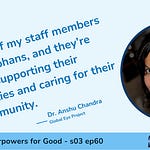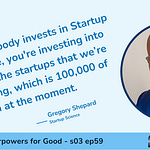You will find a video of the podcast recording below.
Devin: What do you see as your core strength, your inner superpower that will help you get this done successfully?
Lindsay: I will answer that by saying the first day that I didn’t drink, something happened to me. I was down in my kitchen making a coffee, hungover, ashamed, the whole thing. And I could see for the first time—I don’t know why, because I was hungover—but it was like I could see everything in my kitchen clearly, for the first time. I recognized that everything in my kitchen I hated. The teacup. The coffee maker. The tea towel. I hated it all, but I put it there. And so it was in that moment that I realized, if I can put it there, I can unput it there. That began the awareness that I believe that our greatest superpowers are the things that we feared the most in addiction, and I was terrified of. I believed that my life wouldn’t mean anything, and I believed that I wouldn’t be able to make a meaningful connection. [I] had a lot of anxiety around that. And then as I got sober, went through my process though all the inner work—went for the walks, you know, did all the things, went to group meetings with other women, as we share our stuff. I learned that I didn’t have to work at connection. I didn’t have to work at the things that paralyzed me in addiction because they came naturally in recovery.
After coming to terms with her alcohol addiction, Lindsay Sutherland Boal launched an effort to help other women in Canada “live alcohol-reduced or alcohol-free lives in an alcohol-drenched world.” She started She Walks Canada.
Problematic Drinking
Lindsay says there are 6 million women in North America who are dealing with problematic alcohol use. “It is not about how much we drink, but about the impact our drinking has on our lives and the people around us.”
She notes that the stereotypical image of an alcoholic—a middle-aged guy who can no longer hold a job—isn’t relevant for many people with a problem. Signs of problem drinking are more subtle for some. She suggested the following are clues:
If someone is embarrassed to take out the recycling
If someone doesn’t want to go to the regular liquor store because they’re afraid the employees might recognize them.
The drinking is getting earlier in the day.
We change our schedule in our day to accommodate when we can have our next drink.
For those wondering if they have a drinking problem, talking to someone who has had a drinking problem and is now in recovery can help.
She Walks Canada
“She Walks Canada is the national movement to empower and engage women in seeking recovery from alcohol use disorder,” Lindsay says. She emphasizes that women face a different set of issues in recovery than men. Coming together is an essential part of success.
Some women, though certainly not all, associate drinking with an abusive man, boyfriend, spouse, boss or colleague. Group work with men is potentially triggering rather than helpful.
Walking is a crucial part of recovery, Lindsay says. “Just the act of walking can prevent someone from drinking.” So, She Walks Canada organizes walking as a collective, tracking women as they walk across the country virtually.
Recording this conversation in February, Lindsay says her limit for walking outdoors is 35 degrees below zero centigrade. (Trust me, that’s not warm on the Fahrenheit thermometer.)
“It’s like a metaphor for life. You could go in the hot; you can go in the cold; you can do whatever, but you’ve just got to wear the right coat,” Lindsay says.
In addition to walks, She Walks Canada offers facilitated group coaching sessions to help women in recovery. Lindsay says the sessions provide “a safe, private place where you can show up with your camera on, camera off, mic on, mic off, share whatever is you want to say to a bunch of strangers who get it.” Held virtually in French and English, she scheduled the meetings to be convenient across Canada’s time zones.
Lindsay sees a silver lining in the pandemic. “One of the blessings of this whole COVID experience is that there has been a much greater conversation about mental health.” That is contributing to a growing recognition when drinking might be a problem.
How to Develop Your Superpowers in Recovery
Lindsay saw her superpowers develop naturally in recovery. The things she feared the most in addiction became strengths in recovery. For instance, while still in the grasp of her drinking problem, she felt unloved, unappreciated and unable to connect with other people. In recovery, she quickly found love and camaraderie with other people, sharing her journey with them.
She explained that she never thought of herself as an athlete but has wholly reshaped her self-image.
I always wanted to be an athlete. But I can't kick; I can't throw a ball, and I don't have an athletic bone in my body. I was also quite overweight, totally out of shape, with no sport skill set at all. But what ended up happening—And She Walks Canada was certainly part of this—is that I discovered my inner athlete. I had a vision for myself in January 2021 that I don't know what it was. I literally wanted a picture at the end of the year. I wanted a picture of me wearing a bunch of medals. I'm like, ‘What sport?’ ‘How am I going to do that?’ And I said, and there was a little voice inside my head that said, ‘Go the distance.’ My heart goes, ‘With what?’ So I just started walking anyways. Three hundred and sixty-five days later, I completed my 18th ultra-distance trek. The shortest was a 34 kilometer paddle, which is the distance of the English Channel, and I did that in eight hours. And then the longest was the the perimeter of Iceland, 9,333 kilometers!
But that’s not all. She also got serious in the gym. She hired a personal trainer. “I said, ‘Johanna, your job—I’m going to pay you to teach me how to lift with big boys.’ And she said, ‘OK.’ And she did,” Lindsay says. “I go to the gym, and I lift with the big boys because I can hold my own, and I know what I’m doing.”
She sees that as a metaphor for recovery. “When I look in the mirror at myself, at the gym, and I see my physical self getting stronger, it’s an absolute reflection of what’s going on on the inside, you know, and it’s is incredibly empowering.”
Lindsay offers two critical lessons for recovery.
“One of the biggest takeaways is that we are what we believe we are,” she says of the first one. “We are our inner narrative, and we’ve got to be really careful, really mindful about what we say because we’ll believe it.”
Her second observation is that recovery is possible primarily because others have done it and led the way. She says, “What allows us to raise our hand and say me too, what allows us to click on a registration button to show up to a group meeting with a bunch of strangers you never met before and tell them you have a drinking problem is that there are the women that come before us that say, ‘You’re not alone. I was there too.’”
Today, Lindsay is the one saying, “You’re not alone. I was there too.” Following her example and advice can help you find your superpowers in recovery.
















